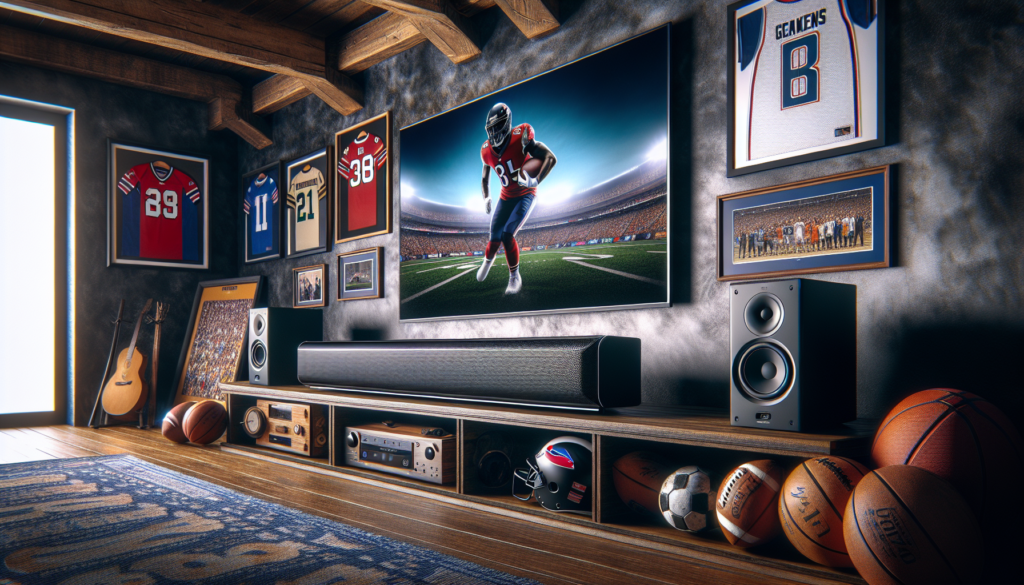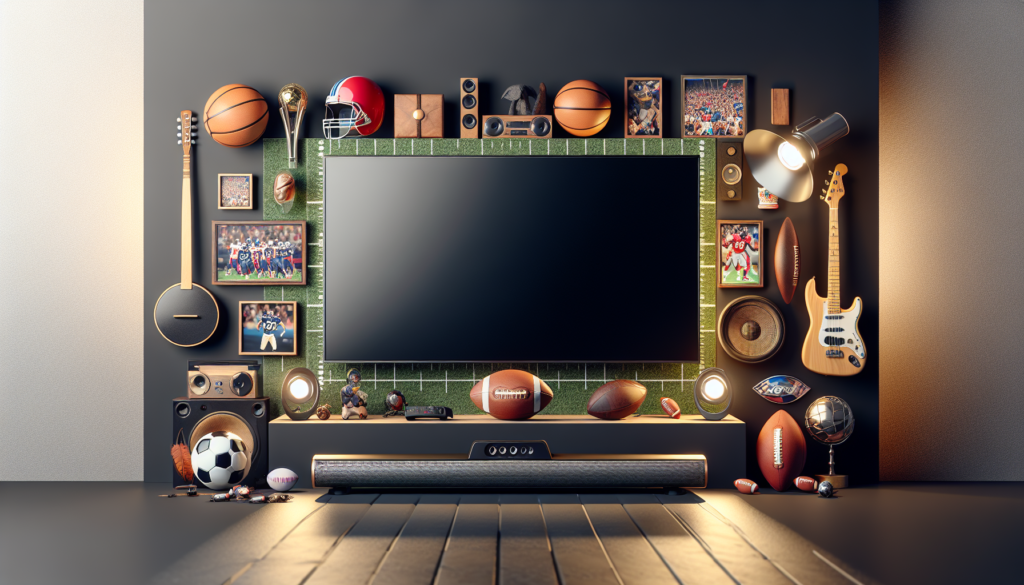Are you a sports fanatic who loves the electrifying atmosphere of a live game? Do you want to bring that immersive sports experience into the comfort of your own home? Look no further! In this Ultimate Guide to Choosing the Best Surround Sound System for Sports, you’ll discover all the tips and tricks to transform your living room into a stadium-like oasis. From understanding the different types of surround sound systems to knowing which features to prioritize, this guide has got you covered. Get ready to feel like you’re right in the center of the action, cheering alongside the crowd, all from the comfort of your own couch.

Understanding Surround Sound Systems
Surround sound is a technology that enhances the audio experience by creating a realistic and immersive sound environment. Instead of hearing sounds solely from the front of the room, surround sound systems use multiple speakers strategically placed around the room to provide a three-dimensional audio experience. This technology is particularly beneficial for sports enthusiasts as it allows them to feel like they are right in the middle of the action, enhancing the excitement and engagement of watching sports events.
Why is Surround Sound Important for Sports?
Sports events are all about the excitement and thrill of the game. Whether you are watching a football match, a basketball game, or a NASCAR race, the ability to hear every nuance of the action can greatly enhance your viewing experience. With surround sound, you can hear the players’ footsteps, the ball bouncing, and the roaring crowd, as if you were right there in the stadium. It adds an extra layer of realism and immersiveness, making you feel like you are a part of the game. This heightened audio experience creates a more engaging and thrilling atmosphere, which is why surround sound is essential for sports enthusiasts.
Types of Surround Sound Systems
There are various types of surround sound systems available in the market today. The most common configurations are 2.1, 5.1, 7.1, and 9.1. The first number indicates the number of main speakers, while the second number represents the number of subwoofers. The more speakers and subwoofers a system has, the more immersive the audio experience will be.
Considerations for Sports Enthusiasts
Quality and Clarity of Sound
When it comes to watching sports, you want to be able to hear every detail with crystal clear clarity. Look for a surround sound system that offers high-quality audio and ensures that each sound is reproduced accurately. This will allow you to hear the subtle nuances of the game, such as the swish of the net or the crack of the bat, making your sports viewing experience more immersive and enjoyable.
Compatibility
Make sure the surround sound system you choose is compatible with your TV or other audio devices. Check for the necessary connections and ensure that the system can seamlessly integrate with your existing setup. Compatibility is crucial to ensure that you can connect your surround sound system easily and enjoy the enhanced audio experience without any hassles.
Ease of Set-Up and Use
For sports enthusiasts, quick and hassle-free setup is essential. Look for a surround sound system that is easy to set up and use. Consider systems that come with user-friendly interfaces and straightforward installation processes. This way, you can spend less time tinkering with the technology and more time enjoying the game.
Required Space
Before purchasing a surround sound system, consider the amount of space you have available. Larger systems with multiple speakers might require more room for optimal placement. Ensure that you have enough space to accommodate the system comfortably without it overwhelming your living space. It’s also important to consider the placement of speakers for optimal sound distribution based on the layout of your room.
Budget
As with any purchase, it’s essential to consider your budget when choosing a surround sound system. Determine how much you are willing to invest and then explore options within that price range. While more expensive systems generally offer better sound quality, there are budget-friendly options available that still provide an enhanced audio experience. Take the time to research and compare models to find the best value for your money.

Speaker Configuration
The speaker configuration you choose will greatly impact the quality and immersive experience of your surround sound system. Here are the most common configurations:
2.1 Surround Sound
A 2.1 surround sound system consists of two main speakers and a subwoofer. This configuration is ideal for smaller spaces or for those on a budget. While it may not provide the same level of immersion as higher configurations, it still offers improved sound quality compared to standard TV speakers. The two main speakers create a wider soundstage, and the subwoofer adds depth to the low-frequency sounds, such as the rumble of engines or the impact of tackles.
5.1 Surround Sound
The most popular choice for many sports enthusiasts is a 5.1 surround sound system. This system includes five main speakers and a subwoofer. The five speakers are strategically placed around the room, with three in the front and two at the sides or rear. This configuration creates a realistic and immersive surround sound experience. The three front speakers produce the main audio, while the two rear speakers provide ambient sounds, such as crowd noise or stadium atmosphere.
7.1 Surround Sound
For those seeking an even more immersive experience, a 7.1 surround sound system may be the ideal choice. It features seven main speakers and a subwoofer. In addition to the five speakers in a 5.1 setup, two additional speakers are added at the rear of the room. This added audio channel enhances the surround sound experience, making it feel as if the sound is coming from all directions. A 7.1 system is perfect for larger rooms or dedicated home theater setups.
9.1 Surround Sound
The pinnacle of surround sound technology is the 9.1 configuration, which includes nine main speakers and a subwoofer. This system adds two additional speakers to the front of the room, creating an even more expansive soundstage. Only suitable for larger rooms or home theaters, a 9.1 surround sound system provides unmatched audio immersion, allowing you to truly feel like you’re part of the action.
Audio Formats and Codecs
When shopping for a surround sound system, it’s important to consider the audio formats and codecs it supports. These formats determine the quality and type of audio that can be reproduced by the system. Here are some common audio formats and codecs to look out for:
Dolby Digital
Dolby Digital is a widely-used audio format that provides high-quality surround sound. It supports up to 5.1 channels of discrete audio and delivers immersive sound for movies, TV shows, and sports events. Dolby Digital is the standard for DVDs and many streaming services.
DTS-HD
DTS-HD offers a superior audio experience with higher-quality sound compared to Dolby Digital. It supports up to 7.1 channels of discrete audio, providing exceptional clarity and depth. Many Blu-ray discs and streaming platforms offer DTS-HD audio for an enhanced surround sound experience.
Dolby Atmos
Dolby Atmos is the latest innovation in surround sound technology. Unlike traditional surround sound, which relies on channel-based audio, Dolby Atmos uses object-based audio to create a more immersive audio experience. It adds height channels to the standard surround sound setup, allowing sound to move around and above you. Dolby Atmos is known for its ability to create a 3D-like soundscape, making it perfect for sports enthusiasts who want the most realistic audio experience possible.
THX
THX is a certification program that ensures high-quality audio and video performance. It sets rigorous standards for sound system performance, ensuring that certified products deliver a superior audio experience. Many surround sound systems carry the THX certification, providing peace of mind that you’ll be getting the best audio quality for your sports viewing experience.
Soundbar vs. Traditional Speakers
When it comes to choosing a surround sound system, you’ll often come across two common options: soundbars and traditional speakers. Each has its own set of benefits, so let’s explore them:
Benefits of a Soundbar
Soundbars are slim, compact, and easy to install, making them a popular choice for those with limited space or who prefer a minimalist setup. They typically come with built-in amplifiers and a set of speakers, eliminating the need for multiple speakers and complicated wiring. A soundbar can deliver impressive audio quality, especially when paired with a subwoofer. It’s a convenient and space-saving option that can still provide an enhanced audio experience for sports enthusiasts.
Benefits of Traditional Speakers
Traditional surround sound systems with individual speakers offer a more customizable and immersive audio experience. With multiple speakers positioned strategically around the room, you can create a wider soundstage and enjoy a more realistic audio environment. Traditional speakers also often provide better sound quality and more power compared to soundbars. If you have the space and want a truly immersive sports viewing experience with optimal sound distribution, traditional speakers may be the way to go.
Wireless vs. Wired Systems
Another consideration when choosing a surround sound system is whether to opt for a wireless or wired setup. Here are the advantages of each:
Advantages of Wireless Systems
Wireless surround sound systems offer the flexibility and convenience of not having to deal with wires and cables. This eliminates the need for complex wiring setups, making installation quick and easy. Wireless systems also allow you to place speakers anywhere in the room without worrying about cable length or connectivity. The absence of wires can create a cleaner and more aesthetically pleasing setup, especially in a living room or home theater environment.
Advantages of Wired Systems
Wired surround sound systems, on the other hand, offer a more reliable and consistent connection. With a wired setup, you don’t have to worry about interference or signal loss that can sometimes be experienced with wireless systems. Wired systems also tend to provide better audio quality and lower latency, ensuring that your sports viewing experience is seamless and uninterrupted. They are a preferred choice for dedicated home theaters or when optimal audio performance is desired.
Room Acoustics
The acoustics of your room play a crucial role in the overall audio performance of your surround sound system. Here are some factors to consider:
Impact of Room Size and Shape
The size and shape of your room can significantly influence how sound travels and is perceived. Larger rooms often require more powerful speakers to fill the space adequately, while smaller rooms may necessitate smaller speakers for optimal performance. Additionally, the shape of the room can affect sound reflections, either enhancing or detracting from the audio experience. Irregularly shaped rooms may require additional acoustic treatments, such as sound-absorbing panels or diffusers, to ensure optimal sound quality.
Tips for Optimizing Acoustics
To optimize the acoustics of your room, consider the placement of your speakers. Experiment with their position, distance from walls, and angle to find the best sound reproduction. Using acoustic treatments, such as curtains, rugs, or foam panels, can help minimize sound reflections and improve overall audio quality. Additionally, positioning your seating area in the center of the room can create a balanced listening experience. Don’t be afraid to experiment and fine-tune the setup to achieve the best possible sound for your sports viewing pleasure.
Brand and Model Selection
When it comes to choosing a surround sound system, researching brands is essential. Some well-established audio brands have a reputation for producing high-quality speakers and sound systems. Look for brands that have been in the industry for a while and have positive reviews from customers. This will give you confidence in the product’s quality and ensure a satisfying sports viewing experience. Additionally, be sure to compare models within the brand to find the one that suits your specific needs and preferences.
User Reviews and Recommendations
In addition to researching brands and models, user reviews play an important role in helping you make an informed decision. Reading reviews from other sports enthusiasts can provide valuable insights into the performance and reliability of the surround sound systems you’re considering. Pay attention to feedback about audio quality, ease of setup, and overall user satisfaction. Sports enthusiasts who have already experienced the systems can offer valuable recommendations based on their personal experiences.
Additional Features
When exploring surround sound systems, it’s worth considering additional features that can enhance your sports viewing experience. Here are some features to look out for:
Smart Home Compatibility
If you have a smart home setup, consider a surround sound system that is compatible with your existing devices. This allows you to integrate your audio system seamlessly into your smart home ecosystem, providing added convenience and control. With smart home compatibility, you can control your surround sound system through voice commands or app integrations, enhancing the overall user experience.
Streaming Services Integration
Many people now rely on streaming services to watch sports events. Look for a surround sound system that offers integration with popular streaming platforms. This allows you to enjoy the enhanced audio experience while streaming your favorite sports events without any compatibility issues. Integration with streaming services ensures that you don’t miss out on the immersive sound while cheering for your favorite team or athlete.
Choosing the best surround sound system for sports can greatly enhance your viewing experience and make you feel like you’re right in the middle of the action. Consider the quality and clarity of sound, compatibility with your existing setup, ease of use and setup, required space, and your budget. Explore different speaker configurations, audio formats, and codecs to find the right system for your needs. Consider the benefits of soundbars versus traditional speakers, as well as the advantages of wireless versus wired systems. Ensure that you optimize room acoustics for the best sound reproduction and invest time in researching brands, reading user reviews, and getting recommendations from sports enthusiasts. Lastly, keep an eye out for additional features, such as smart home compatibility and streaming services integration, to further enhance your sports viewing experience. With the right surround sound system, you’ll never miss a moment of the action and feel like you’re at the stadium cheering on your favorite team.



